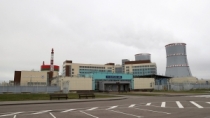Opinion: Political rhetoric over BelNPP belies EU-Belarus technical cooperation

The journalist points out that cooperation between Belarus and the EU is continuing, despite Lithuania's position. Belarus decided to volunteer for stress tests, despite not being an EU country.
The European Nuclear Safety Regulators Group (ENSREG) experts visited the BelNPP site in February as part of a peer review of Belarus' National Action Plan for the NPP (itself based on ENSREG findings). Earlier ENSREG's evaluations of the facility were largely positive. Officials noted that their Belarusian counterparts tried to address major recommendations to emerge from EU stress testing of the site's safety protocols.
According to Craig Turp-Balazs, statements from Lithuanian officials regarding the threat ostensibly posed to their country seem to have influenced views of Belarus' NPP among many MEPs, pushing them to oppose the project and doubt the validity of the collaboration already taking place between Brussels and Minsk to ensure the safety of BelNPP.
For example, the resolution drafted by Romanian MEP Cristian Buşoi describes the NPP as a source of possible threat to the European Union and calls for its operations to be suspended until all recommendations from ENSREG's stress testing are fully implemented – a condition ENSREG itself does not impose.
As ENSREG points out in its draft report, the regulatory group's findings are not meant to authorize or prevent the authorization of nuclear power plants. Rather, the report emphasizes that a stress test exercise remains a targeted exercise reviewing the safety of certain aspects of a nuclear power plant.
The journalist points out that the same VVER-1200 reactor model installed at the BelNPP is also used at the Hanhikivi NPP in Finland, while older VVER-213 and VVER-320 reactors are currently in use at NPPs including Hungary's Paks, Slovakia's Bohunice and Mochovce, and Czechia's Dukovany and Temelin.
Craig Turp-Balazs concludes that the political discourse and the concrete technical findings surrounding the NPP seem to be following divergent tracks, with the latter having little impact on the former.













